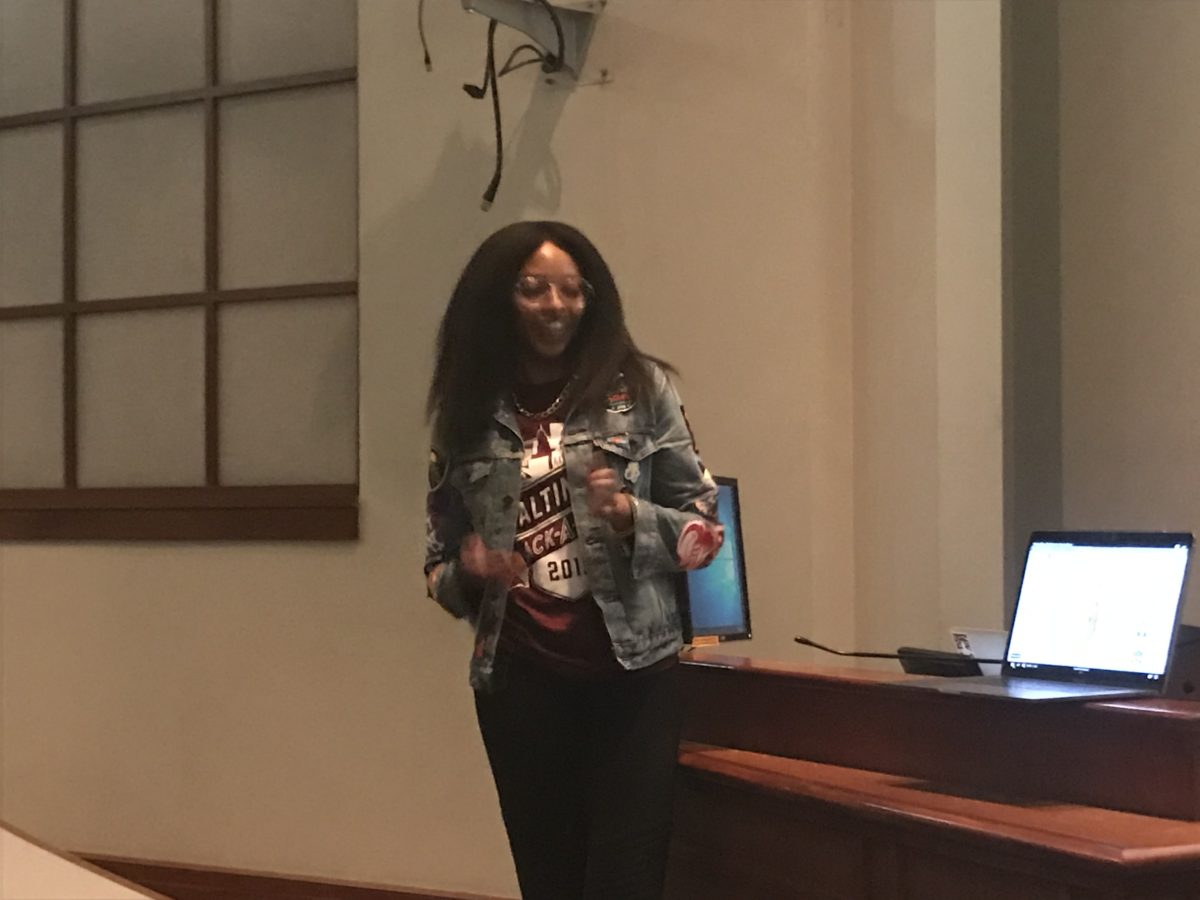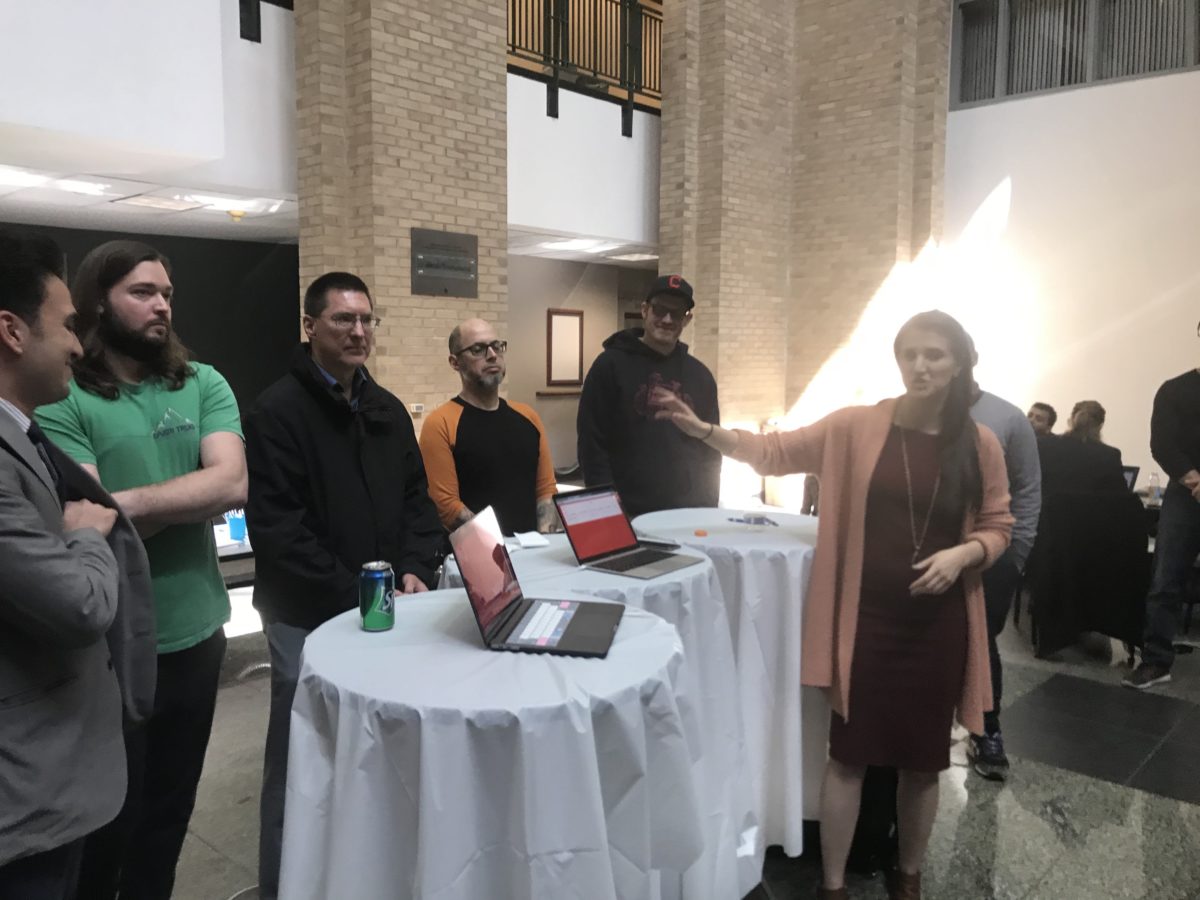Nonprofits. The bus system. Bulletin boards.
Those were just a few of the areas where teams looked to bring new technology at the sixth Baltimore Hackathon. There was even room for music and railguns.
For the event, 60 participants gathered at the University of Baltimore’s Thumel Business Center over the weekend of March 22 to 24 to build projects on 16 teams.
After building for 16 hours, teams presented projects to win $9,600 in prizes. Judges included Frostburg State University professor Oluwadamilola (Dami) Arinde, software engineer Chris Strom, BCIT Digital DevOps Director Jet Lu and TEDCO Pre-seed Builder Fund Co-Manager McKeever Conwell.
Here’s a look at what the teams built:
Leveled
This team set out to bring crowdfunding to career moves. Through the platform, users can raise money from their network to fund a month of unpaid work that helps gain key experience in a new career. When companies make a hire, they pay back the crowd. The team of Jeremy Neal, Paige Finkelstein, Mike Raykher and Joseph Cureton won first prize in the software projects category.
Rebirth of the Calzone
Larry Gray built a new tool to help get upvoted on Reddit. Gray set out to reverse engineer the process of making a post that proved popular, zeroing in on the name of a post. The technology combines a REST API and machine learning to predict whether a title will get attention. The project won second place in the software category.

Larry Gray presents Rebirth of the Calzone to judges. (Photo by Stephen Babcock)
News451
Jeffrey Yang, Daniel Huang and Havish Netla took on the issue of reliable information sources and fake news with their app. The team used machine learning to create an application to determine the reliability of a news source, and applies a scale to determine bias. The team won first place in the civic tech category.
Bmore Transit Track
The project aims to bring transparency to public transit. Using open data from real-time GPS tracking on every bus and publicly available schedules, the team created a visualization to show if a bus is early, late or on-time over the course of a route. This project won second place in civic tech, and was voted audience favorite.
Serenity
Derek Fields presented the drone that can be used for crowd control during a frantic situation at a large event. The drone has an LED ticker with illuminated lettering that can display a message directing people to a safe exit or to watch their step. The project won first place in the hardware category.
MakerBae
Quierra Wells spent the weekend making earrings, and gained experience in digital manufacturing. Using Fusion360 and 3D modeling, Wells created nine 3D-printable products. The effort earned second place in the hardware category.

Quierra Wells discusses MakerBae at the sixth Baltimore Hackathon. (Photo by Stephen Babcock)
Music Thing
Phil Edwards created a touchscreen keyboard that brings the sound of a digital piano to a phone screen. Edwards picked up skills by adding a “multitouch” function that allows several notes to be played at once.
Region
Creating a virtual bulletin board, this project allows users to digitally “drop” documents at a location. Anyone at the location can then view it. The team suggested use cases from a scavenger hunt to restaurant reviews to classroom use. Giancarlo Bautista, Justus Eapen and Sean Madigan teamed on the project.
Spare
Merlin Patterson’s app, debuted at GiveBackHack last month, provides a way for users to donate spare change to charity. Spare temporarily stores and tracks transactions, rounding up to the nearest dollar and setting aside the change. Users can donate to a nonprofit of their choice.
BFB Furniture Connection
Baltimore Furniture Bank collects gently used furniture from universities, businesses and individuals to help people in poverty furnish a home. Jonathan Prozzi created an inventory management system that shows available items, and updates as they find a home.
Whos-in
This project offers a way to learn about events on short notice. Organizers can post a form showing the key details, allowing others looking for plans to opt-in.
BaltCrime
Jasmin Callaway and Santiago Lisa set out to create a website that shares crime data in an easy-to-digest way for Baltimore residents.
Ticket Stub Diary
Dave Fine collected ticket stubs from visits to concerts, museums, movies and other memorable visits around the world over 15 years. He created a website that serves as a digital diary to provide a database of the experiences and share.
Innovation Portal
The Baltimore Hackathon was filled with ideas. This team wanted to make sure they live on past the weekend. Through this repository, the ideas presented at hackathons, pitch competitions and inside accelerators around Baltimore can be accessed.

Karina Mandell (right) presents Innovation Portal to judges. (Photo by Stephen Babcock)
Benchtop Linear Accelerator
This team including Robert Cicconetti, Bradford Kuhn and Paul Grodt, set out to build a railgun, which uses electromagnetic force to launch projectiles. The weekend produced “pretty sparks,” and experience shooting high-speed video, as well.
Alturnative to Fear
Seeking to combat the use of fear as a primary motivator to move people to address climate change, Tom Riley is leading an effort to create videos, write essays, and short stories that encourages buy-in to take action.
Before you go...
To keep our site paywall-free, we’re launching a campaign to raise $25,000 by the end of the year. We believe information about entrepreneurs and tech should be accessible to everyone and your support helps make that happen, because journalism costs money.
Can we count on you? Your contribution to the Technical.ly Journalism Fund is tax-deductible.
Join our growing Slack community
Join 5,000 tech professionals and entrepreneurs in our community Slack today!

The person charged in the UnitedHealthcare CEO shooting had a ton of tech connections

The looming TikTok ban doesn’t strike financial fear into the hearts of creators — it’s community they’re worried about

What a new innovation index tells us about Baltimore


